
Issue 3 | December 06, 2010
News & Events
You Like Trade 20 Negi for One Kabocha?
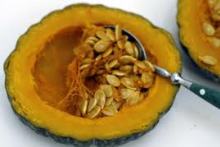 In these tough economic times, finding a low-cost or free family outing that also provides a holiday gift or two is a boon. The O‘ahu Urban Garden Center Seed Swap, held Dec. 11, fits the bill! Learn how to collect and store seeds, and exchange your seeds for others. Seeds will also be available for sale. These packets of potential can be great stocking stuffers! The Garden gives these pointers: If bringing seeds to exchange, package them in a moisture-free Ziploc bag and label with as much information as you have, including a description of what the flowers, fruit, or vegetables will look like. Finally, package every variety in its own separate baggie. If you’re not sure how to collect seeds in order to swap them, think about attending the Seed Saving for the Home Gardener workshop, given from 9:30 to 10:30 a.m. and repeated from 11:00 a.m. to noon. Alvin Yoshinaga, from the Lyon Arboretum Seed Conservation Lab, will be there to offer foolproof tips for saving your seeds year after year. The cost is $5 at the door for the workshop (the exchange is free). Walk-ins are welcome, and pre-registration is not required. Space is limited, though, so sign in at the door by 9 a.m. to reserve a seat.
In these tough economic times, finding a low-cost or free family outing that also provides a holiday gift or two is a boon. The O‘ahu Urban Garden Center Seed Swap, held Dec. 11, fits the bill! Learn how to collect and store seeds, and exchange your seeds for others. Seeds will also be available for sale. These packets of potential can be great stocking stuffers! The Garden gives these pointers: If bringing seeds to exchange, package them in a moisture-free Ziploc bag and label with as much information as you have, including a description of what the flowers, fruit, or vegetables will look like. Finally, package every variety in its own separate baggie. If you’re not sure how to collect seeds in order to swap them, think about attending the Seed Saving for the Home Gardener workshop, given from 9:30 to 10:30 a.m. and repeated from 11:00 a.m. to noon. Alvin Yoshinaga, from the Lyon Arboretum Seed Conservation Lab, will be there to offer foolproof tips for saving your seeds year after year. The cost is $5 at the door for the workshop (the exchange is free). Walk-ins are welcome, and pre-registration is not required. Space is limited, though, so sign in at the door by 9 a.m. to reserve a seat.
Grants & Awards
A SMART Collaboration
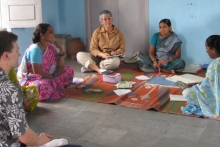 The Department of Natural Resources and Environmental Management has received funding for several international projects, including Sustainable Management of Agroecological Resources for Tribal Societies (SMARTS). Principal investigators Travis Idol (NREM), Catherine Chan-Halbrendt (NREM), and Chittaranjan Ray (Water Resources Research Center) are joined by Susan Crow (NREM), Carl Evensen (NREM), Ted Radovich (TPSS), and Krisna Suryanata (Dept. of Urban and Regional Planning) are collaborating with local non-governmental organizations, universities, and institutes in India and Nepal. Due to environmental degradation and increased population density, there is less and less productive land that tribal peoples can use for their traditional agricultural projects in regions of India and Nepal, resulting in, as the researchers point out, “lower productivity, degradation of soil and water resources, impairment of health—including severe malnutrition—and loss of livelihood options.” The project aims to help local peoples to use resources more effectively, practice conservation measures, and target ways to sell their products. It is also finding ways to address the needs of local women who have been traditionally barred from these farming practices.
The Department of Natural Resources and Environmental Management has received funding for several international projects, including Sustainable Management of Agroecological Resources for Tribal Societies (SMARTS). Principal investigators Travis Idol (NREM), Catherine Chan-Halbrendt (NREM), and Chittaranjan Ray (Water Resources Research Center) are joined by Susan Crow (NREM), Carl Evensen (NREM), Ted Radovich (TPSS), and Krisna Suryanata (Dept. of Urban and Regional Planning) are collaborating with local non-governmental organizations, universities, and institutes in India and Nepal. Due to environmental degradation and increased population density, there is less and less productive land that tribal peoples can use for their traditional agricultural projects in regions of India and Nepal, resulting in, as the researchers point out, “lower productivity, degradation of soil and water resources, impairment of health—including severe malnutrition—and loss of livelihood options.” The project aims to help local peoples to use resources more effectively, practice conservation measures, and target ways to sell their products. It is also finding ways to address the needs of local women who have been traditionally barred from these farming practices.
Thorne on the Range
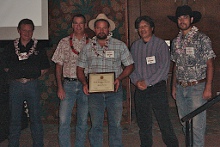 Mark Thorne (HNFAS), State Range Extension Specialist, received the Range Manager of the Year Award from the California-Pacific Section of the Society for Range Management at the Hawai‘i Cattlemen’s Convention held Nov. 19. One award is given each year to a professional in range management in California or Hawai‘i who has made a substantial contribution to their field. Mark’s extensive research and education programs throughout Hawai‘i and the Western Pacific earned him this well-deserved recognition. The Society for Range Management is an international professional organization of individuals with a common interest in the study, management, and rational use of rangelands and related ecosystems. Pictured from left to right are Tim Richards, Alan Gottlieb, Mark Thorne, Glen Fukumoto (Extension), and Matt Stevenson (Extension).
Mark Thorne (HNFAS), State Range Extension Specialist, received the Range Manager of the Year Award from the California-Pacific Section of the Society for Range Management at the Hawai‘i Cattlemen’s Convention held Nov. 19. One award is given each year to a professional in range management in California or Hawai‘i who has made a substantial contribution to their field. Mark’s extensive research and education programs throughout Hawai‘i and the Western Pacific earned him this well-deserved recognition. The Society for Range Management is an international professional organization of individuals with a common interest in the study, management, and rational use of rangelands and related ecosystems. Pictured from left to right are Tim Richards, Alan Gottlieb, Mark Thorne, Glen Fukumoto (Extension), and Matt Stevenson (Extension).
Future Scientists of America
The 4-H program, in order to prepare children for the brave new world they’re growing up in, has been placing increasing emphasis on science and technology. Hawai‘i recently received a Science Implementation grant of $1,500 from 4-H, to be used by teams attending the Science Academy at the national 4-H Center to gain information to share with other staff back home. The grant will also help staff and volunteers to achieve their 4-H Science Plan of Action goals through trainings, webinars, and orientations in the first part of 2011. These grants are made possible through the generous funding of the Noyce Foundation and the hard work of 4-H National Headquarters and the National 4-H Council.
Spotlight on Our Community
Local-Style Grinds
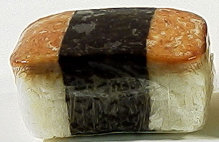 The subtitle of the Hawai‘i Foods Web site is “Nutrition with Aloha.” We figure that they decided “One of the few places on the Web where you can find out how much zinc is in a SPAM musubi”* isn’t as catchy, but it’s just as true. Beyond that important information, hungry searchers can look up recipes and nutrition information for a cornucopia of local foods, including Hawaiian, Japanese, Filipino, Korean, and more. Already had too much mac salad and meat jun and want to start watching your diet? Hawai‘i Foods includes the “PacTrac” or “My Diet” feature, an interactive portal into which users can enter the foods they have eaten and get a personalized analysis of their food intake. The Web site, begun in 2007 by researchers from COF and HNFAS, is being updated to incorporate the USDA’s revised Food Pyramid, and more recipes and foods are continually being added. The site also offers a library of downloadable food publications on such subjects as food additives and safety, historical foods, and the impact of technology on foods.
The subtitle of the Hawai‘i Foods Web site is “Nutrition with Aloha.” We figure that they decided “One of the few places on the Web where you can find out how much zinc is in a SPAM musubi”* isn’t as catchy, but it’s just as true. Beyond that important information, hungry searchers can look up recipes and nutrition information for a cornucopia of local foods, including Hawaiian, Japanese, Filipino, Korean, and more. Already had too much mac salad and meat jun and want to start watching your diet? Hawai‘i Foods includes the “PacTrac” or “My Diet” feature, an interactive portal into which users can enter the foods they have eaten and get a personalized analysis of their food intake. The Web site, begun in 2007 by researchers from COF and HNFAS, is being updated to incorporate the USDA’s revised Food Pyramid, and more recipes and foods are continually being added. The site also offers a library of downloadable food publications on such subjects as food additives and safety, historical foods, and the impact of technology on foods.
*How much zinc is there, you ask? Visit the site to find out.
A Lot for a Little
 The Expanded Food and Nutrition Education Program (EFNEP) helps limited-income families with young children to expand their knowledge of nutrition and improve their diets, teaching basic cooking skills, food safety, and ways to better manage their food budget. The program collaborates with the Supplemental Nutrition Assistance Program-Education (SNAP-Ed), formerly Food Stamp Nutrition Education, another federal–State partnership that supports nutrition education for the improved health of those with limited resources. Program graduates say it works: They have increased knowledge; enhanced skills; and greater nutrition, health, and well-being. In Hawai‘i, both EFNEP and SNAP-Ed are now under the umbrella of the Nutrition Education for Wellness (NEW) project called LIFE-II, a community nutrition outreach project for limited-income audiences. Extension educators statewide are helping to make this new collaboration a success, including Julia Zee, Lynn Nakamura-Tengan, Naomi Kanehiro, Laura Kawamura, and Claire Nakatsuka. To find out more about EFNEP’s programs, check out their newsletter here.
The Expanded Food and Nutrition Education Program (EFNEP) helps limited-income families with young children to expand their knowledge of nutrition and improve their diets, teaching basic cooking skills, food safety, and ways to better manage their food budget. The program collaborates with the Supplemental Nutrition Assistance Program-Education (SNAP-Ed), formerly Food Stamp Nutrition Education, another federal–State partnership that supports nutrition education for the improved health of those with limited resources. Program graduates say it works: They have increased knowledge; enhanced skills; and greater nutrition, health, and well-being. In Hawai‘i, both EFNEP and SNAP-Ed are now under the umbrella of the Nutrition Education for Wellness (NEW) project called LIFE-II, a community nutrition outreach project for limited-income audiences. Extension educators statewide are helping to make this new collaboration a success, including Julia Zee, Lynn Nakamura-Tengan, Naomi Kanehiro, Laura Kawamura, and Claire Nakatsuka. To find out more about EFNEP’s programs, check out their newsletter here.
Keeping Up with Carbon
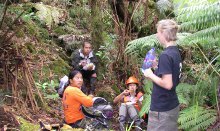 Too much carbon dioxide in the air leads to global warming. That’s understood. What’s less well understood is how to draw the excess out of the atmosphere. Much of it is stored in the soil and in plants, but this balance is likely being altered by climate change—how much, we’re not yet sure. Joey Quitan (undergrad, NREM), Kevin Kaneshiro (technician, NREM), Darcey Iwashita (master’s candidate, NREM) and Olivia Schubert (undergrad, NREM) are part of a large collaboration that is using a natural elevation/temperature gradient in the Laupahoehoe area of the Island of Hawai‘i to understand how rising temperatures will impact ecosystem services and processes in native Hawaiian wet forests. Find more information here.
Too much carbon dioxide in the air leads to global warming. That’s understood. What’s less well understood is how to draw the excess out of the atmosphere. Much of it is stored in the soil and in plants, but this balance is likely being altered by climate change—how much, we’re not yet sure. Joey Quitan (undergrad, NREM), Kevin Kaneshiro (technician, NREM), Darcey Iwashita (master’s candidate, NREM) and Olivia Schubert (undergrad, NREM) are part of a large collaboration that is using a natural elevation/temperature gradient in the Laupahoehoe area of the Island of Hawai‘i to understand how rising temperatures will impact ecosystem services and processes in native Hawaiian wet forests. Find more information here.